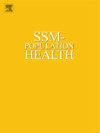Impact of health shocks on social capital: How long will it persist?
IF 3.1
2区 医学
Q1 PUBLIC, ENVIRONMENTAL & OCCUPATIONAL HEALTH
引用次数: 0
Abstract
Adverse health shocks impoverish over 150 million individuals worldwide annually. These shocks harm the health, wealth accumulation, and well-being of patients and their families. However, the effect of health shocks on social capital and their persistence remains uncertain. This cross-sectional study conducted in 2023 in socioeconomically deprived rural areas of Shandong, China, employed Ordinary Least Squares regression to examine the impact and persistence of health shocks on social capital. The results indicated that 29.24 % of households experienced health shocks. Households affected by health shocks within the past year showed a significant decrease in social capital (β = −2.82, P < 0.001).This impact diminished over time (between one and three years ago: β = −1.49, P = 0.21; more than three years ago: β = −1.10, P = 0.36). The findings also reveal a stronger impact on cognitive social capital compared to structural social capital (cognitive social capital: β = −1.78, P = 0.001; structural social capital: β = −1.038, P = 0.006). Policymakers should not only offer financial aid to families suffering from health shocks but also focus on restoring their social capital.
健康冲击对社会资本的影响:会持续多久?
不利的健康冲击每年使全世界超过1.5亿人陷入贫困。这些冲击损害了患者及其家属的健康、财富积累和福祉。然而,健康冲击对社会资本的影响及其持续时间仍不确定。这项横断面研究于2023年在中国山东社会经济贫困的农村地区进行,采用普通最小二乘回归来检验健康冲击对社会资本的影响和持久性。结果显示,29.24%的家庭经历过健康冲击。过去一年内受健康冲击影响的家庭的社会资本显著下降(β = - 2.82, P <;0.001)。这种影响随着时间的推移而减弱(1至3年前:β = - 1.49, P = 0.21;β = - 1.10, P = 0.36)。与结构性社会资本相比,认知社会资本对认知社会资本的影响更大(认知社会资本:β = - 1.78, P = 0.001;结构性社会资本:β =−1.038,P = 0.006)。政策制定者不仅应该向遭受健康冲击的家庭提供经济援助,而且应该把重点放在恢复他们的社会资本上。
本文章由计算机程序翻译,如有差异,请以英文原文为准。
求助全文
约1分钟内获得全文
求助全文
来源期刊

Ssm-Population Health
PUBLIC, ENVIRONMENTAL & OCCUPATIONAL HEALTH-
CiteScore
6.50
自引率
2.10%
发文量
298
审稿时长
101 days
期刊介绍:
SSM - Population Health. The new online only, open access, peer reviewed journal in all areas relating Social Science research to population health. SSM - Population Health shares the same Editors-in Chief and general approach to manuscripts as its sister journal, Social Science & Medicine. The journal takes a broad approach to the field especially welcoming interdisciplinary papers from across the Social Sciences and allied areas. SSM - Population Health offers an alternative outlet for work which might not be considered, or is classed as ''out of scope'' elsewhere, and prioritizes fast peer review and publication to the benefit of authors and readers. The journal welcomes all types of paper from traditional primary research articles, replication studies, short communications, methodological studies, instrument validation, opinion pieces, literature reviews, etc. SSM - Population Health also offers the opportunity to publish special issues or sections to reflect current interest and research in topical or developing areas. The journal fully supports authors wanting to present their research in an innovative fashion though the use of multimedia formats.
 求助内容:
求助内容: 应助结果提醒方式:
应助结果提醒方式:


